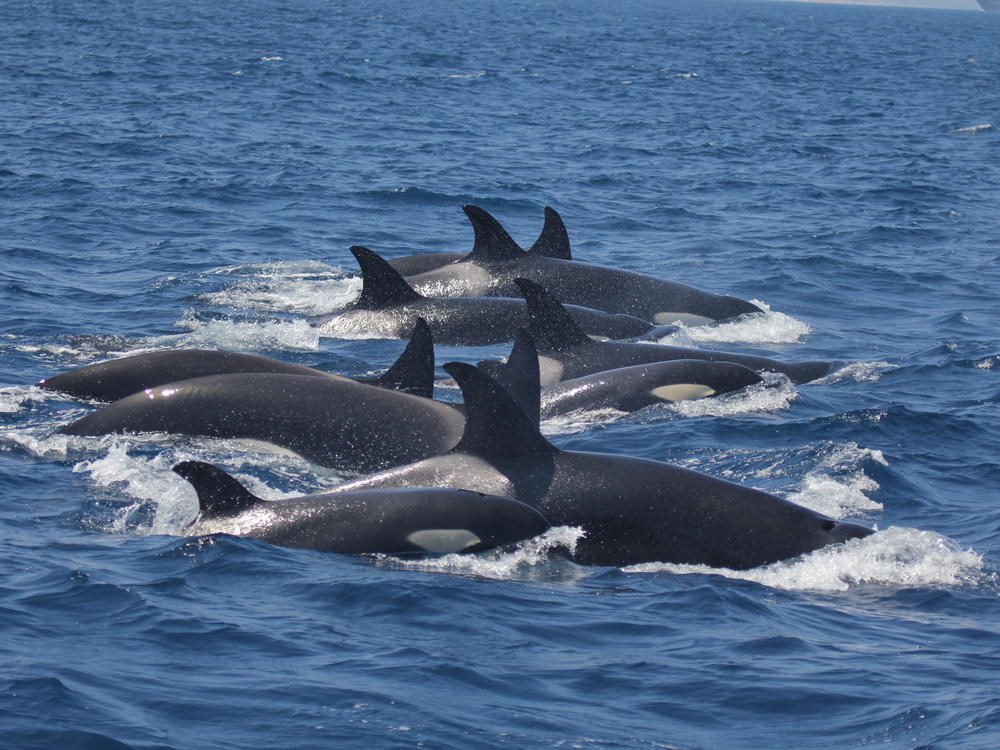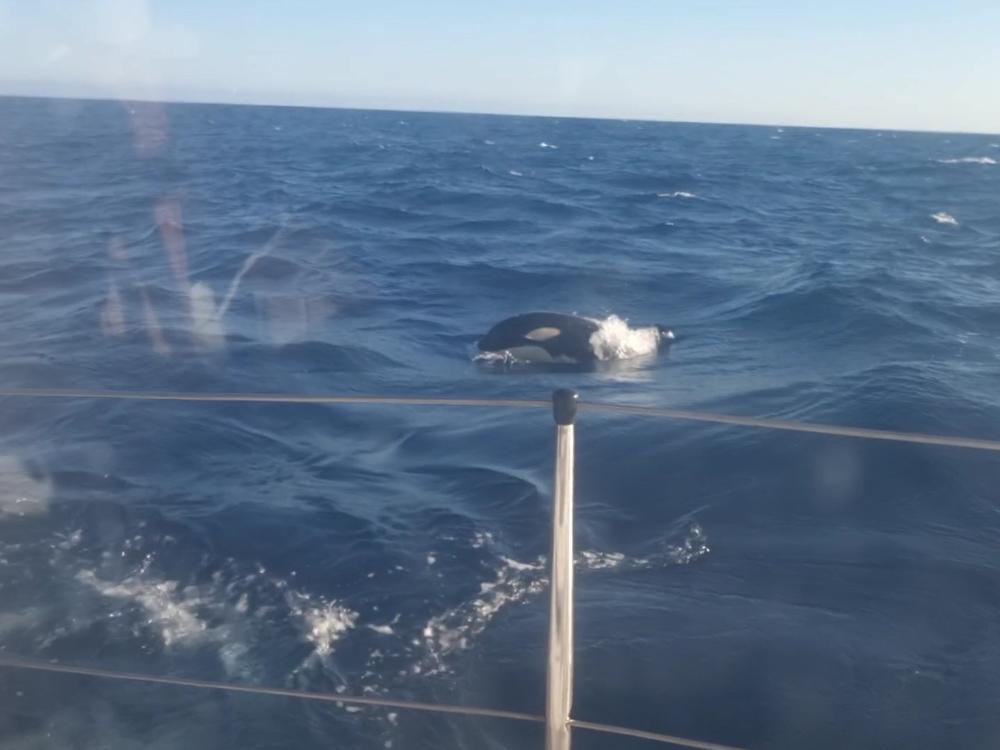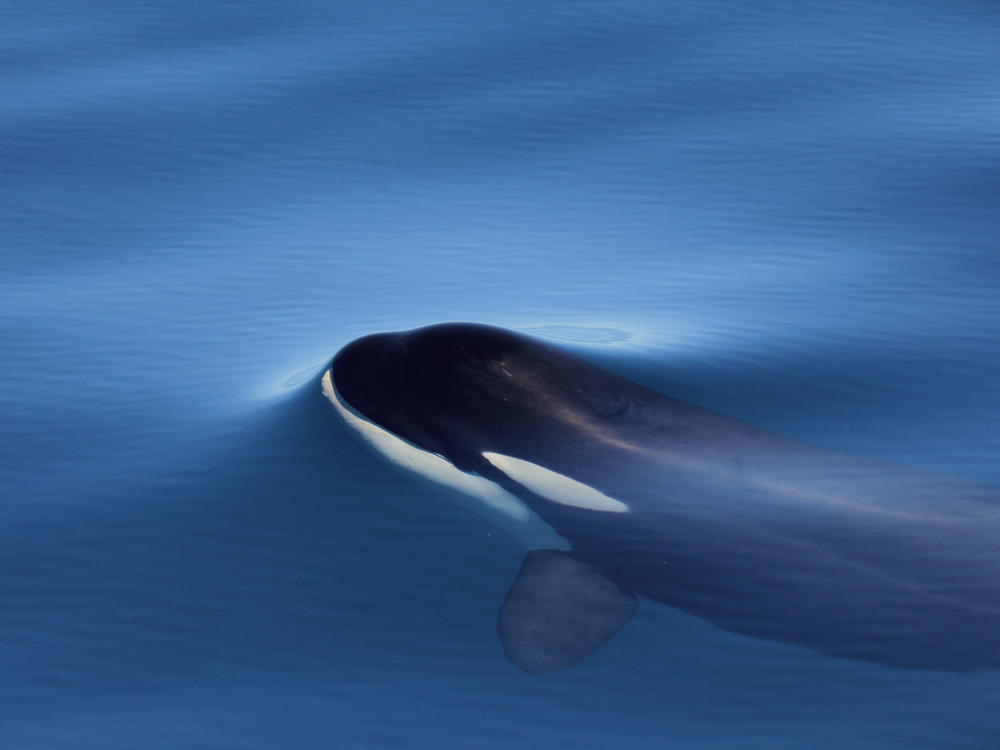Section Branding
Header Content
Killer whales are 'attacking' sailboats near Europe's coast. Scientists don't know why
Primary Content
Ester Kristine Storkson was asleep on her father's small yacht earlier this month, sailing off the coast of France, when she was violently awakened.
Scrambling on deck, she spotted several orcas, or killer whales, surrounding them. The steering wheel swung wildly. At one point, the 37-foot sailboat was pushed through 180 degrees, heading it in the opposite direction.
They were "ramming the boat," Storkson says. "They [hit] us repeatedly ... giving us the impression that it was a coordinated attack."
"I told my dad, 'I'm not thinking clearly, so you need to think for me,'" the 27-year-old Norwegian medical student says. "Thankfully, he is a very calm and centered person, and made me feel safe by gently talking about the situation."
After about 15 minutes, the orcas broke off, leaving father and daughter to assess the damage. They stuck a GoPro camera in the water, she says, and could see that "approximately three-quarters of [the rudder] was broken off, and some metal was bent."
For any vessel, losing steering at sea is a serious matter and can be dangerous in adverse conditions and some sailboats have had to be towed into port after orcas destroyed their rudders. Fortunately, the Storksons had enough of their rudder left to limp into Brest, on the French coast, for repairs. But the incident temporarily derailed their plan to reach Madeira, off northwest Africa, part of an ambitious plan to sail around the world.
There is no record of an orca killing a human in the wild. Still, two boats were reportedly sunk by orcas off the coast of Portugal last month, in the worst such encounter since authorities have tracked them.
The incident involving the Storksons is an outlier, says Renaud de Stephanis, president and coordinator at CIRCE Conservación Information and Research, a cetacean research group based in Spain. It was farther north -- nowhere near the Strait of Gibraltar, nor the coast of Portugal or Spain, where other such reports have originated.
That is a conundrum. Up to now, scientists have assumed that only a few animals are involved in these encounters and that they are all from the same pod, de Stephanis says.
"I really don't understand what happened there," he acknowledges. "It's too far away. I mean, I don't think that [the orcas] would go up there for a couple of days and then come back."
These encounters — most scientists shun the word "attack" — have been getting the attention of sailors and scientists alike in the past two years, as their frequency seems to be increasing. Sailing magazines and websites have written about the phenomenon, noting that orcas seem to be especially attracted to a boat's rudder. A Facebook group, with more than 13,000 members, has sprung up to trade personal reports of boat-orca encounters and speculation on avoidance tactics. And, of course, there are no shortage of dramatic videos posted to YouTube.
Scientists don't know the reason, but they have some ideas
Scientists hypothesize that orcas like the water pressure produced by a boat's propeller. "What we think is that they're asking to have the propeller in the face," de Stephanis says. So, when they encounter a sailboat that isn't running its engine, "they get kind of frustrated and that's why they break the rudder."
Even so, that doesn't entirely explain an experience Martin Evans had last June when he was helping to deliver a sailboat from Ramsgate, England, to Greece.
About 25 miles off the coast of Spain, "just shy of entering the Strait of Gibraltar," Evans and his crew mates were under sail, but they were also running the boat's engine with the propeller being used to boost their speed.
As Evans was on watch, the steering wheel began moving so violently that he couldn't hold on, he says.
"I was like, 'Jesus, what's this?'" he recalls. "It was like a bus was moving it. ... I look to the side, and all of a sudden I could just see that familiar white and black of the killer whale."
Evans noticed "chunks of the rudder on the surface."
Jared Towers, the director of Bay Cetology, a research organization in British Columbia, says "there's something about moving parts ... that seem to stimulate them."
"Perhaps that's why they're focused on the rudders," he says.
The population of orcas along the Spanish and Portuguese coasts is small and de Stephanis believes that the damage to boats is being done by just a few juvenile males.
If so, they may simply outgrow the behavior, de Stephanis says. As the young males get older, they will need to help the pod hunt for food and will have less time for playing with sailboats.
"This is a game," he speculates. "When they ... have their own adult life, it will probably stop."
Towers says such "games" tend to go in and out of fashion in orca society. For example, right now in a population he studies in the Pacific, "we have juvenile males who ... often interact with prawn and crab traps," he says. "That's just been a fad for a few years."
Back in the 1990s, for some orcas in the Pacific, something else was in vogue. "They'd kill fish and just swim around with this fish on their head," Towers says. "We just don't see that anymore."
Copyright 2022 NPR. To see more, visit https://www.npr.org.



